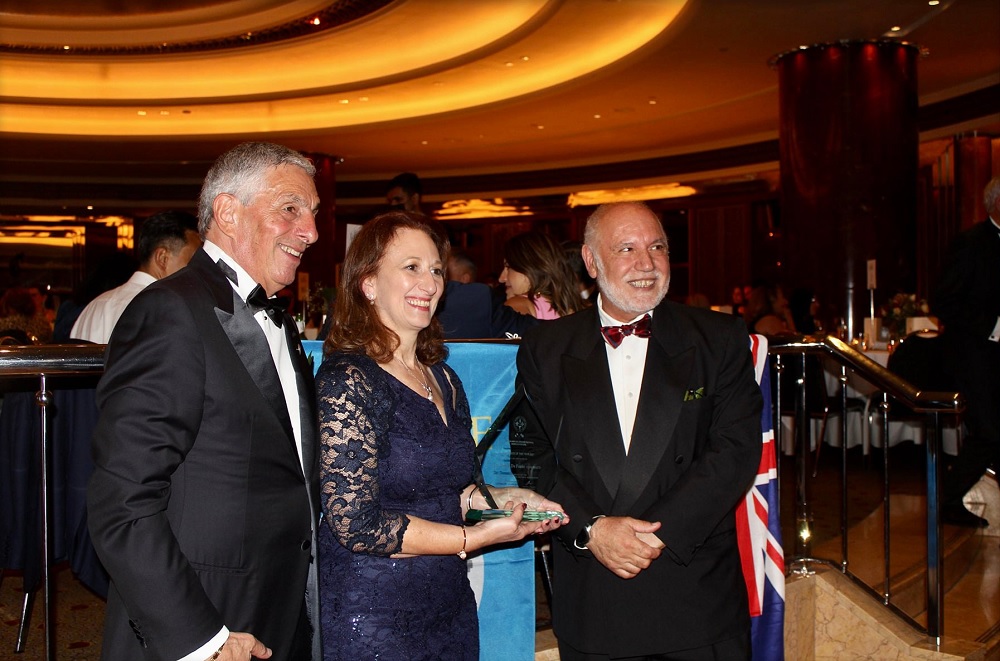Founded in 2017, the association works tirelessly to promote the southern Italian region of Calabria and stamp out negative stereotypes that no longer have a place in society.
“So many calabresi have contributed to the growth of this nation,” the association’s president, Vincent Morfuni, said.
“We established the association to protect our culture and overcome unnecessary clichés.”
The ACCA held its first event in two years on April 2, at the Park Hyatt Hotel in Melbourne.
The highlight of the gala was the presentation of the Calabrese dell’Anno 2021 award.
The evening began with a welcome speech by Democratic Party MP Nicola Carè, who commended the association for its work in promoting and preserving Calabrian culture.
Morfuni then thanked founding members, vice president Vince Mirabelli and treasurer Pasquale Rocca, for their valuable contributions to the association.
The Calabrese dell’Anno 2021 award was then presented to Teresa De Fazio OAM, who is widely recognised for her contribution to tertiary education and her active involvement in refugee communities.
De Fazio has been the manager of the Cultural Diversity Office at Victoria University since 2013 and is the editor of Segmento.
She has held roles at the Victorian Multicultural Commission, Multicultural Arts Victoria and Edmund Rice Community and Refugee Services.
During her acceptance speech, De Fazio said she was “truly touched” to have received the award.
“To say that I feel honoured to be standing here is definitely an understatement,” she added.
“My story is no different from that of any other child migrant who has come here; I’m sure we have similar stories of growing up caught between two worlds and trying to work out our identities.
“What I do know is that the calabresi are quiet, resilient and hard working.
“Growing up, being calabrese seemed to attract prejudice, even from some Italians at times; I watched and learnt, however, the uselessness of labels and their power to silence.
“Thanks to my father’s determination, I had the advantage of education, the most powerful means of social transformation.”
De Fazio recognised the immense value of multiculturalism from an early age, helping her family to translate documents and forms from English into Italian.
“All of a sudden I found my voice,” she said.
“I found myself standing up at meetings to ensure that the voices of those who are not at the table are heard.
“I learnt the importance of allowing people to express their own identity, through language, festivities, faith and food.”
De Fazio also paid tribute to her parents, whom she said have always been quiet role models for the community.
“My father [Pasquale], who is originally from the small town of Nicastro, didn’t think twice about becoming a Country Fire Authority volunteer.
“In fact, he almost lost his life in Mount Macedon and he didn’t say anything; he came back after four days absolutely black because the ash had seeped into his skin.
“As a typical calabrese, he turned to my mother and said: ‘Maria, I don’t ever want to see a cup of tea again; all I wanted was a glass of red wine and they always gave me that dirty water!’
“That was the only thing he ever complained about.
“My family later found out about the incident through the media.
“My mother has always been selfless too, constantly cooking and taking care of people in the community.
“The mantra in my house was: ‘Fai bene scordati, fai male pensaci’ (Do good deeds, forget about them; do something bad, think about it).”
Visibly moved, De Fazio dedicated the award to her beloved parents, her children Luca and Isabella, the latter of whom was present at the ceremony, and her loved ones in Calabria.
“This is a tribute to the resilience and warmth of my Italian family, who have taught me so much about life, shared the values of humanity and always assured me of support,” she concluded.
“Even though we’re far away, we’re always close.”
Following the evening’s success, the ACCA will hold its next event on June 4 at the Da Vinci Club in Mildura to present the Calabrese dell’Anno 2020 award, after the initial ceremony was postponed several times due to COVID-19 woes.
The committee is also working on a series of initiatives moving forward, including: an exchange program between the University of Melbourne and the University of Calabria; an expo in Victoria to introduce new typical products of the region; and the development of the Sono Calabrese online series, featuring videos posted on YouTube in which well-known representatives of the local community tell their stories.
“Stereotypes are our biggest obstacle but the important thing is to never stop narrating our past and looking to the future,” Morfuni concluded.












